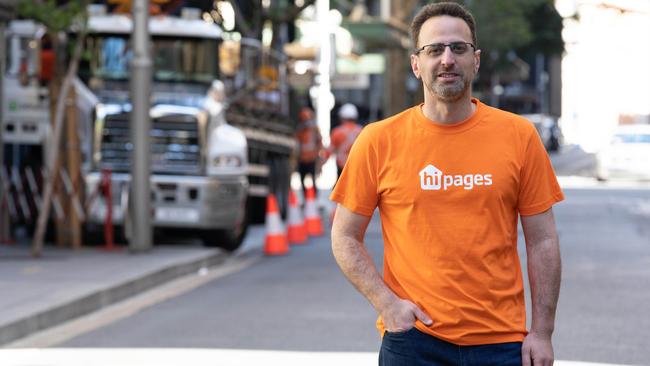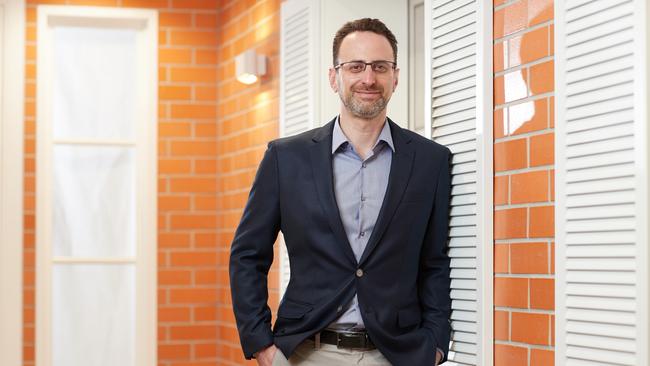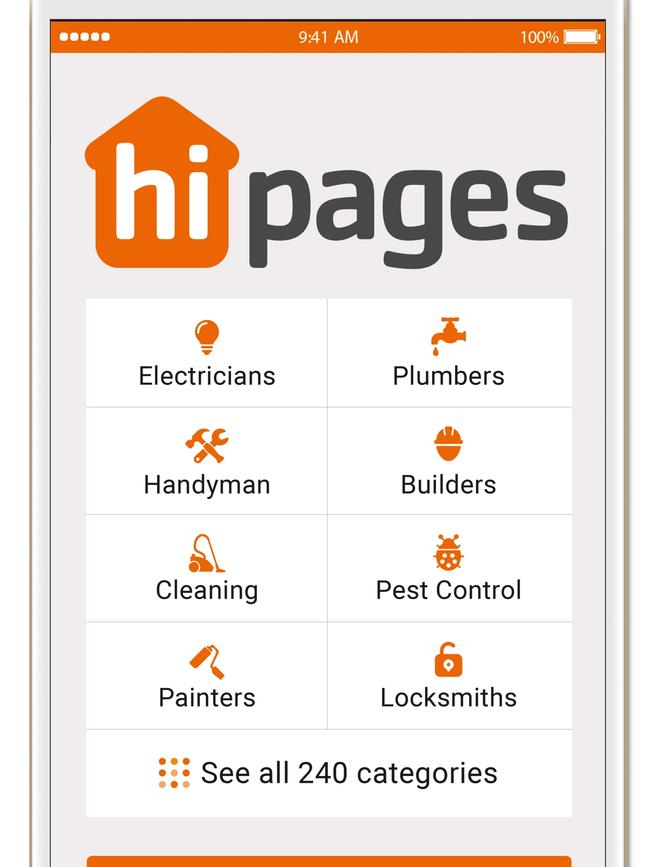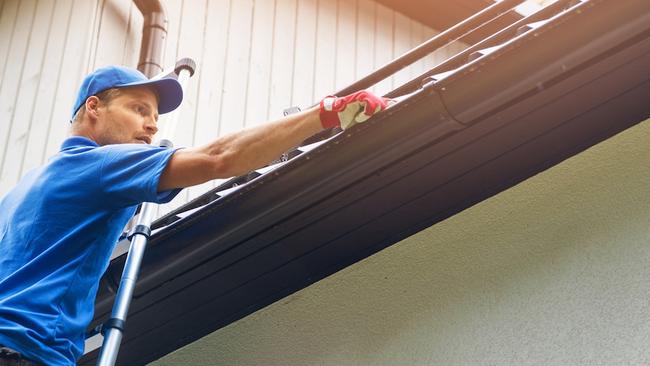Hipages’s CEO Roby Sharon-Zipser reveals secret to success
From earning $5 a day making shirts to unimaginable wealth, Hipages boss Roby Sharon-Zipser was never going to be someone else’s employee.

Roby Sharon-Zipser was only five years old when he started working in his grand parents’ shirt-making factory in Sydney, earning $5 a day.
The family were the original owners of Bisley Shirts, whose high-vis workwear is now a household name following years of promotion on the Nine Network’s hit renovation show The Block.
Roby’s first job in the factory was organising coat hangers. He also helped his aunts in the office with cleaning and counting inventory.
But soaring interest rates and high tariffs on clothing apparel, a trademark in the second half of the 1980s, combined to eventually send the business broke.
In 1991, Roby’s grandparents reluctantly sold the Bisley trademark to the Gazals, the veteran retailing brothers who control the listed Gazal Corp.
“I was young when that happened. I was a teenager. So now I’m definitely wary of the banks. I’ve seen that first-hand,’’ Roby says.
“It’s hard when your parents tell you that you’ve got to make some sacrifices in your life because of what happened to their parents.”

From the ruins of Bisley, Roby’s parents started their own wholesale and retail mens and women’s apparel business called Galward Trading, which had a factory outlet in inner-city Surry Hills.
Roby worked there on weekends during school and school holidays. During his senior school years he also established his own car washing business. Later at the University of NSW, where he studied commerce, he had his own menswear stall.
When he left university, he worked with PricewaterhouseCoopers and Allco Finance Group before starting his own boutique accounting firm Advanced Audit Solutions, offering audit, accounts payable and recovery services.
His clients included firms such as JB Hi-Fi, Arnotts biscuits, Tyco and General Pants.
“I’ve got a lot of small business experience. I’ve seen the trials and tribulations of owning a business and the idea of working really hard and the sacrifices you make,” he says.
In 2004 he teamed up with fellow entrepreneur David Vivek to found the online tradespeople’s platform Hipages in a suburban garage. It started as a trades directory business, before pivoting to an on-demand model.

“I wasn’t born into money or anything like that. I created everything from my own hard work. I’ve always known I was going to have my business,” Roby says.
“I don’t think I’m a good employee. I’ve always just had too many opinions, too many views and maybe been too argumentative.”
Hipages listed on the ASX with a $320m initial public offering in November last year and over the past 12 months the shares have risen more than 70 per cent, as the company upgraded its prospectus forecast and in August reported strong 2021 results across all key metrics.
Australians renovating at record levels throughout the Covid-19 pandemic has given added impetus to the business, despite the impact of further lockdowns during 2021.
Covid boost
Roby says the business has highlighted the strong correlation between rising vaccination rates and improving consumer sentiment.
“We have been big beneficiaries of what has happened in Australia in the past 18 months. We did over 1.5m jobs in Hipages last year. 34,000 trade businesses are on the platform. House prices are astronomical, so people are renovating. As a result people who own their home have equity in the property, so that is going into their renovation,” he says.
“Covid-19 has also demonstrated people can work from home, so people are improving their properties. They are making their spaces more comfortable and building more home offices. Online adoption has also gone nuts. People are really getting used to engaging with providers online.”

Hipages now plans to continue investing in research and development - it currently has more than 100 technology staff and recently invested in a property management technology platform called Bricks + Agent — as it taps into the wider on-demand tradie ecosystem.
The firm has also engineered a massive change to its business model, moving beyond purely a job-leads platform to a subscription system where tradies pay a regular fee to get access to job leads.
Ninety-four per cent of its revenue now comes from reoccurring sources.
To drive subscriptions further, Hipages in June introduced a new field service softwear solution for tradies called Tradiecore, an administrative tool offering features such as quoting and invoicing. It is currently being rolled out to the existing customer base.
Longer term it will be packaged up as a broader subscription service where tradies can accept different forms of payment, including buy now, pay later options.
Roby says Hipages also plans to offer lending products, insurance and even eventually procurement solutions, allowing tradies to use the platform to directly order materials to be delivered to a work site.
“What we see down the track is really nice opportunities through payment solutions and lending solutions for the tradies because we can see how much they’re invoicing and we can support them with lending to help them with their cash flow,” he says.
“We can see a future where we will be providing consumers with on demand, fixed-price services.”
Hipages also recently expanded into New Zealand with the $11.8m purchase of the country’s biggest online trades platform called Builderscrack.
After the float of the company last year News Corporation — publisher of The Australian — remained Hipages’ biggest shareholder with a 25.7 per cent stake, while Roby still owns 6.6 per cent.
Ellerston Capital and local venture capital fund Right Click Capital are also investors.
Roby believes Hipages has an unique place in the stable of News investee technology companies.
“News likes to control businesses so we are unusual. They recognised we had something special and have wanted to keep the founder mindset without the obligations that come with being a much larger organisation,” he says, noting access to the print, pay-TV and online advertising opportunities offered by News has been important in lifting broader awareness of the business.
The Hipages name has also been boosted by its commercial relationship with “The Block”, which started three years ago.
Despite the fierce rivalry between News and the Nine Entertainment Group, Roby says the former was totally supportive of the Nine partnership, which helped take awareness of the brand to a new level.
David Vitek stepped down as CEO two years ago, leaving Roby - then co-CEO - to take the role. Roby denies there was any falling out between the co-founders, although he says it is good to now have a single voice at the top on strategy. Vitek is no longer a non-executive director at Hipages, resigning from this position in November, 2020.
“He worked 15 years in the business and he reached the point where he wanted to move onto something else. We are still good friends,’’ he says.
Hipages is chaired by former Citi investment banker Chris Knoblanche, who was chosen for the role last year ahead of the IPO from an initial list of 150 candidates.
Unimaginable wealth
Knoblanche has since secured the financial backing ex-Tiger Global operating partner and former SEEK executive Jason Lenga for the business.
Roby says the best piece of advice he has received from Knoblanche was to simply let go more often.

“As founders you really like to control and know the detail and what should be reasonable and logical. He told me capital markets don’t necessarily work that way. ‘Don’t get emotional about it and don’t let it get to you’,” he says.
“In the past three years I have definitely matured and grown up a lot. I’ve also learned to delegate - I didn’t delegate enough before.”
The success of the business has brought Roby, his wife Jordana - they were married at Sydney’s Central Synagogue on June 29, 2003 - and their two now teenage children wealth that was once unimaginable.
They have since made headlines for their property purchases, which have not always been well timed.
In mid-July 2018 they paid $8m for the Vaucluse home of Andrew and Denise Lazarus, a big trade-up for from their former North Bondi property, which they sold in 2016 for $2.85m.
The Vaucluse home sits on a spacious 845 sqm block and features extensive outdoor entertainment areas that includes a self-contained guesthouse, cabana, and swimming pool. Inside the main house, there are five bedrooms and four baths.
A year later they reportedly sold the home for only $6.85m.
Roby was named for the first time on a magazine rich list in 2016, well before the float of the Hipages business. He claims he hated it.
“I found it a little embarrassing to be honest with you. I’m a little bit shy. If you go back to that magazine you won’t see a photo of me in there. I didn’t provide one because I didn’t want to be on the list and I argued very heavily to lower my value,” he says.
“I guess you can call me a little bit frugal. I have probably relaxed a bit over the years, as I’ve got older. But I am careful. I think I really consider everything and particularly with the business, I’m very, very conscious that we’re not wasting our investors’ money. Everything has to be commercial, everything has to have a return on investment. Because of my experiences of seeing money come and go. I’m very disciplined.”
He says Jordana also grew up in a hard working family.
“Its just not in our DNA to be show-offs or, what’s the word, flamboyant? It’s just not our style. We want to be comfortable and want our children to be safe,” he says.
He says his children now have to earn their keep and be prepared to make the sacrifices he once did to build a successful business from nothing.
“There’s a lot of discipline. We don’t just unnecessarily lavish them with things. They have to work for everything. They have chores to do, they have pocket money, and if they don’t do the chores, they don’t earn the pocket money,” he says proudly.
“I want my kids to respect money and I want them to earn their own keep in the world. If we can help them, we’ll do what we can. But at the end of the day, they have to have to fend for themselves, they have to get an education and their own jobs. I want them to have the same discipline that my wife and I have long had.”






To join the conversation, please log in. Don't have an account? Register
Join the conversation, you are commenting as Logout